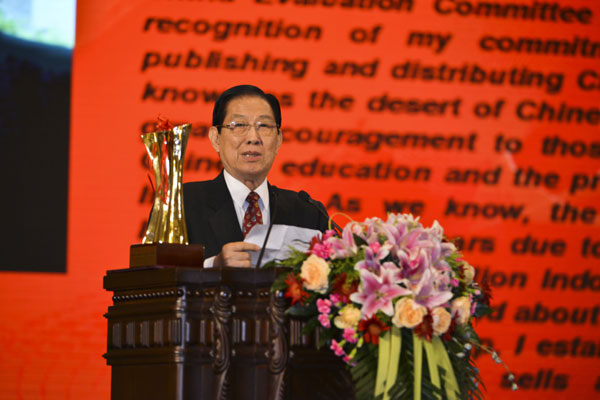Yoza Suryawan, an 80-year-old Chinese Indonesian publisher, tried hard to hold his sobs when accepting the 2013 Special Book Award in Beijing.
The prize was awarded by China's General Administration of Press, Publication, Radio, Film and Television to honor Suryawan's persistent effort in promoting Chinese language and culture through publication and education.
No one knows more about the longing for their mother culture in time of suppression than Suryawan himself, and about how much courage and faith is required to make one move on.
"I love the land of Indonesia, but I also love the profundity of Chinese culture. So I firmly believe it's necessary for the Indonesian people to read, learn, and understand China," he says in a shaky voice, but with a gentle and confirmed tone.
 |
|
“I love the land of Indonesia, but I also love the profundity of Chinese culture. So I firmly believe it’s necessary for the Indonesian people to read, learn, and understand China.” Yoza Suryawan, Chinese Indonesian publisher. |
A second-generation Chinese immigrant in Indonesia from the Guangdong province, Suryawan has tasted the delight of spreading Chinese culture through books as well as the hardships when his home language was prohibited from appearing in the public domain from 1965 to 1998 in Indonesia.
"The lifelong love I have for the Chinese language started from childhood days of reading little comic-strip books that the adults sneaked in from boat trips," Suryawan says.
The comic books he read were mainly based on ancient Chinese classics, whose traditional Chinese wisdom and virtue deeply inspired him.
After graduating from university, Suryawan was involved in publishing a journal and started a foundation to encourage Chinese writing in the early 1960s.
He enjoyed a rewarding and successful career until the mid-1960s, by which time he and his colleagues had published 90 Chinese books including Lu Xun's The True Story of Ah Q.
In the days of cultural suppression, Suryawan had to stop publishing Chinese books and he started a printing business instead. In the 1970s, he achieved the status of "The King of the Wall Calendar".
"I hired some of the Chinese language teachers, who were jobless because of the policy then, to work in my company," he says. "That's all I could do in those years to sustain and help them."
A book fair on Chinese books in 2000 was warmly embraced in Indonesia, helping Suryawan, who lent a hand in organizing the fair, reignite his passion in Chinese language and culture.
"It was an outburst of passion after 32 years of suppression," he recalls.
He then decided to open Chinese bookstores, and started the Mandarin Book Store, of which he is currently the president.
Suryawan was warned that the bookstores had a great risk of failing because of a limited market due to a two-generation gap in Chinese language ability in Chinese Indonesians.
"I feel it's my mission to pass on the Chinese culture and I insisted," he says.
Soon he found out that because of the lack of employees with Chinese proficiency, he, then in his 70s, had to pick up the thousands of titles all by himself on computer every time the bookstores made orders.
"And I had to write brief introductions on new titles myself," he adds. "I'm really short of energy as I'm reaching my 80s."
Even though he had to subsidize the bookstores with his own money every month during hard times, he managed to make them survive and published the comic-strip books of the four Chinese ancient classics in Indonesian, as well as many Chinese-language learning textbooks.
Now the books are sold in 150 bookstores in his country. And the Indonesian people can enjoy reading his childhood favorites.
"As Suryawan himself has become a cultural bridge, his bookstores have also become a cultural icon in Indonesia," the Special Book Award committee commented on his achievements.
Suryawan says there are about 20 million Chinese Indonesians.
"Now they're making the effort to catch up on learning their mother language. And the trend is on the rise," he says.
Also winning a 2013 Special Book Award were American scholar Ezra Vogel, Italian Sinologist Lionello Lanciotti, Argentinean writer Jorge E. Malena, Egyptian translator Mohsen Fergani and Swedish translator Anna Gustafsson Chen.
Since the first award in 2005, a total of 33 foreign translators, writers and publishers from 14 countries have been honored for their contribution in promoting Chinese culture to the world.
The 83-year-old Vogel, whose work Deng Xiaoping and the Transformation of China is a recent bestseller in China, says: "I have been studying China for half a century ... I wrote in English for an American audience. It is a special honor to know that Chinese friends feel that my book has also contributed to the Chinese people's understanding of Deng and his era."
|
|
|
|
|
|
|
|
